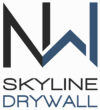FAQ
WHY LEVEL 5
A level 5 finish is the highest caliber that can be achieved in drywall. Regardless of how skilled the tradesman is there is still a difference of texture between the drywall paper and areas where joint compound has been applied. If painting without applying a skim coat, drywall seams may photograph through the paint due to difference of texture. Therefore, by applying a skim coating over the entire surface any incidental imperfections in the drywalled area are filled. This will insure the entire surface will be uniformly smooth across seams, fasteners, and drywall paper. It is highly recommended where high gloss paints and direct lighting or large windows are near. Critical lighting may include side-lighting from fixtures or natural lighting coming in from windows.
HOW IT WORKS
Choose the level based on the area and finish you need. We will also provide our expert advice based on our professional assessment. Give us a call for a free quote.
Level 1: Joint tape is set with a thin layer of joint compound at all joints and interior corners. Joints and fastener heads (nail, screws, accessories) do not need to be embedded with joint compound. Recommended use: plenums above ceiling, attics, service corridors, elevator shafts, concealed and hidden areas.
Level 2: As in level 1, all seams, angles, fastener heads, (nail, screws, accessories) and corner beads are covered with a thin coat of joint compound. The surface must be free from excess joint compound, but tool marks and ridges are acceptable. Recommended use: garages, warehouses, mechanical rooms, and other storage areas.
Level 3: As in level 2, joints, angles, and fasteners will receive an second coat. Joints, fastener heads and corner beads need two coats of joint compound at this level, where in level 2 you just need one coat. All surfaces including joint compound, shall be smooth and free of ridges. Recommended use: Where a heavy wall covering or medium to heavy texture will be applied over the wall surface.
Level 4: Fasteners, joints, angles, and corner beads have a total of three coats. Joint compound has been sanded smooth, there cannot be any tool marks or ridges, and is ready to be primed and painted. A level 4 finish is used where flat paints and light textures will be applied. It is the most common type of finish and is considered the typical drywall level of finish. This finish will still show imperfections in the most severe lighting. Recommended use: With flat paints or light textures finishes. Enamel, semi-gloss, and gloss paint is not recommended for level 4 finish.
Level 5: For a level 5 finish, a level 4 finish is achieved and then a thin skim coat is applied over the entire surface. The skim coat can be a joint compound of a manufactured material specifically for this purpose. This skim coat is smooth and does not have any ridges or tool marks and is sanded in detail to a smooth finish. Primer and paint must still be applied. Recommended use: For flat, enamel, semi-gloss, and gloss paints. Additional textures are not recommended.
A: The cost of hiring a drywall contractor in Oregon can vary depending on project size, complexity, and specific requirements. Obtaining multiple quotes from different contractors is recommended to get a comprehensive understanding of the costs involved.
A: The duration of a drywall installation project depends on factors such as the size of the project, complexity of the design, and contractor availability. Discussing the timeline with your chosen contractor will provide a more accurate estimate.
A: Many reputable drywall contractors in Oregon guarantee or warranties for their workmanship. Clarify the terms and conditions of any guarantees offered before signing a contract.
A: Yes, drywall contractors often have experience in creating custom design features, such as arches, niches, or textured finishes. Discuss your specific design ideas with the contractor to see if they can accommodate your request.
A:Yes, Absolutely! We can provide recommendations and implement soundproofing techniques, such as additional layers of drywall, specific types of drywall and sounddampening materials, to minimize noise transmission between rooms.
Remember to maintain open communication with your chosen Oregon contractor, clearly define project requirements, and ensure you have a written contract that outlines the scope of work, timeline, and payment terms. With these considerations in mind, you can confidently begin your drywall project confidentially.
